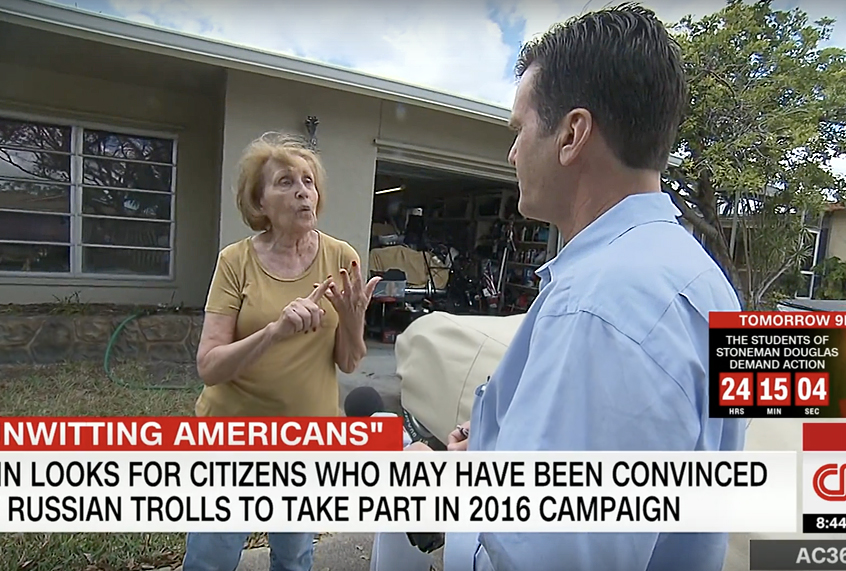The media’s unrelenting zeal to find Trump supporters who unwittingly engaged with Russian bots means that badgering older women in front of their homes is now considered professional news gathering. Welcome to an average day in 2018.
In an uncomfortable exchange, CNN correspondent Drew Griffin tracked down a woman named Florine Gruen Goldfarb on the lawn of her suburban home in Florida, to question whether she knew she had apparently made contact with Russians through a Facebook page she used to run called “Team Trump Broward County.” (The page no longer exists.) Goldfarb’s group posted in advance about a pro-Trump flashmob in August of 2016, which some of its members then attended. According to the recent indictment of 13 Russian nationals associated with a troll farm based in St. Petersburg called the Internet Research Agency, that event was organized by a front group created by the Russian organization.
Griffin’s persistence could be perceived as dogged reporting, if it weren’t for the glaring question of why CNN would bother to spend time and resources on publicly shaming this woman for an unwitting association. As media reporter Yashar Ali and Pulitzer Prize winner Glenn Greenwald both pointed out on Twitter, Goldfarb is a private individual, not a public official or a celebrity with great power or social-media influence. What public service is provided by shaming or confront her?
Apparently, the purpose of this CNN report was to find American voters who fell victim to the manipulation of a nefarious instigator. Its result? Goldfarb became the target of a slew of disparaging comments on her personal Facebook page from people who saw the video, calling her “treasonous,” among many other things. If the primary goal of Russian trolls was to sow discord, they only succeeded because the hyper-partisan and vitriolic nature of our political discourse was already so ripe for exploitation.
Goldfarb herself resorted to talking points about Hillary Clinton and “her bandits” while defending herself from questions about communications with Russians. The entire exchange highlighted the absolutist lens through which Americans view each other and the mind games we play with ourselves to justify our views. Anti-Trumpers walked away from this clip seeing red, and you can bet that pro-Trumpers like Goldfarb saw this report as further evidence that CNN is fake news and that news stories about the Russia scandal have a hidden agenda.
Foreign influence in the 2016 election, and throughout social media at large, is by no means an insignificant story. We can be angry that some people (on both the right and left) fell prey to a campaign of exploitation, but the rush to identify individuals as stooges of outside manipulation — as if their opinions were not legitimate, or not their own — only highlights our collective obsession with finding blame at the expense of inward reflection. Russian trolls didn’t make the grievances held by voters or activists in any of the targeted groups less real, and journalists of all people should be wary of attempts to discredit political speech or discount unorthodox opinions.
What is often overlooked amid all this short-term, reactionary thinking is that attempts to meddle in our political system or spread propaganda won’t always come from Russia. Other political villains will surely come along and seek to mimic these manipulation tactics in the future. Our divisions run deep and have now been aired for the whole world to see because of the open nature of American society, making the country an open target. But if we focus on venting our frustrations and turning on each other, rather than digging deep to explore the root causes of our political fissures, we do so at our own peril. The test America now faces is how we respond to this political moment. So far, we’re eating ourselves alive.


